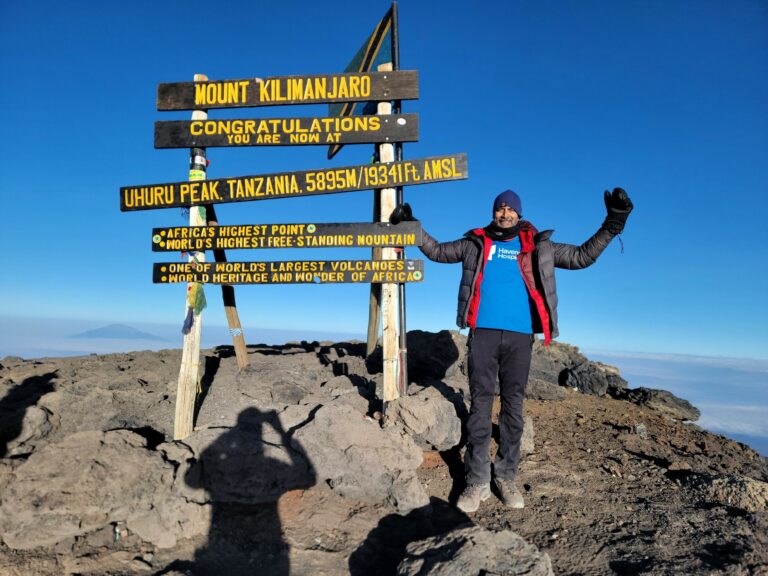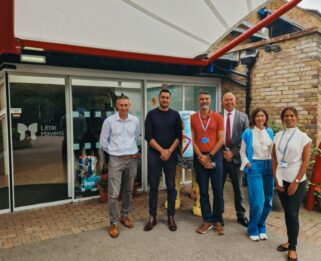Trekking affords you hours of solitude and time to think and reflect. I have attempted to capture some of these thoughts below.
1: Life is Tough.
When the plans first came up, I was told that Kilimanjaro is not a technical climb and a reasonable level of fitness would get you to the top. But don’t be fooled! Climbing Mt. Kilimanjaro is not just a walk up a mountain. It is tough! The ascent is steep. The terrain changes daily, the climate hourly. High altitude means headaches, nausea and fatigue. Walk. Climb. Eat. Sleep. Repeat. For seven days? Very tough. But when you’ve done the day’s work; when you’ve made it to the top – it feels great and oh so worth it. You throw up your hands and celebrate!
Reflection: Life is tough. Deal with it. But don’t forget to celebrate your victories.
2: It’s not always as it seems.
As we go up the mountain trail, everything seems far, far away and way up high! “How will I ever get there?” I think, as I sized up the goal, stopping to take in a deep breath. But you keep going, and you get there. You make it.
Reflection: Things are not always as tough as they look. Things are not always as easy they look. But stick to it and you’ll get there.
3: It’s all in the Planning.
We were ten climbers in the group. Our support team was 50! The expedition was seven days. The team needed to carry all that was needed for 60 of us to live on the mountain for a week. And it felt like we had everything : foam mats to sleep on, abundant food – even mayonnaise and tabasco! Medicines for almost anything – altitude sickness, muscle aches, water purification and hydration. Camping Gear – sleeping tents, dining tent (with chairs, tables with tablecloths & solar-powered lights), kitchen tents, cooking utensils, stoves. All credit to our organiser, Ian Taylor Trekking.
On a personal level too, sensible planning is critical – packing the right clothes to manage the varying temperatures, the right shoes, foodstuff, personal medication, and then ensuring it all fits into one back-pack no more than 12 kilos. This was a great lesson and demonstration of Resource Planning.
Reflection: If you fail to plan. You plan to fail.
4: Go Slow. Go Together.
“Polé! Polé!” These two words probably define the Kilimanjaro Climb. It means “Slow! Slow!” in Swahili. You are constantly reminded to go “Polé! Polé!” – by the guides and the porters who pass you. While climbing the mountain taking it slow is critical to maintaining a steady heart rate and acclimatising to the high altitude. It also keeps the group together and builds camaraderie, which is what it’s all about, isn’t it?
The same applies to life. As we navigate through the madness of life – work, family, relationships, traffic – we often fail to take a pause and breathe, we fail to take time for ourselves. Once in a while we must slow down. Go Polé, Polé. As an old African saying goes: If you want to go fast, go alone. If you want to go far, go together (and go slow).
5: When you give. Give selflessly.
“Did you say you had a support team of 50!?” . Yes, and these are the true superheroes of Kilimanjaro who make it happen for hundreds of climbers like us each year. It is a large team, indeed, but all with clearly defined roles – guides, cooks, helpers, dish-washers, camp managers, porters and even two folks dedicated to the portable loos! While I’ve mentioned that it’s a tough experience, these guys really do everything to help you.
6am: There’s a rustle at your tent as two heroes wake you with a cup of steaming tea and a wide grin as you unzip the tent to a blast of freezing mountain air.
6:30am: A pail of warm water is delivered so you can have a wash and thaw your paws.
7am: Breakfast at the dining tent, and at 8am we’re off on the day’s trek.
Around 30 to 45 minutes later, the air rings with calls of “Jambo!” the Swahili greeting which means “Hello!” and our team of heroes pass us by carrying our entire campsite on their heads and shoulders. Each one carries around 20-25 kilos, while we struggle with our 3-4 kilo day back-packs! By the time we reach the next camp, after a six to eight hours hike, we are greeted with warm smiles and hugs accompanied by the rhythmic and energising sounds of the Kilimanjaro songs and chants.
Reflection: Our success on the mountain was in large measure due to our support team. In life too, there are many around us who deserve credit for what we achieve, whose contributions we sometimes fail to acknowledge.
6: Count your Blessings. Be Grateful.
On the mountain, one is forced to ‘make do’. I began to miss the material comforts back home. The warmth of my bed, the familiar food, hot water baths and my filter coffee. I chatted with the team and heard about their lives. At times I felt very alone on the mountain. A lot of time to myself. To think. To reflect. I missed my family. I missed my sons. I felt fortunate to be able to do this. I thought about how I often wanted more and realised that I already had pretty much all I needed. Then I thanked the Almighty and the Universe for all that I had. I counted my blessings and I felt good. I am blessed.
Reflection: Be grateful for what you have. Everyday.
Last but not the least, doing this to raise money for Havens Hospices was a no brainer! The charity strive to provide the best palliative nursing and supportive care to adults and children living with complex or incurable conditions. The trek might have been difficult but nothing compared to what our patients and their families have to endure throughout illness, death and bereavement.
Thank you, Kilimanjaro.




